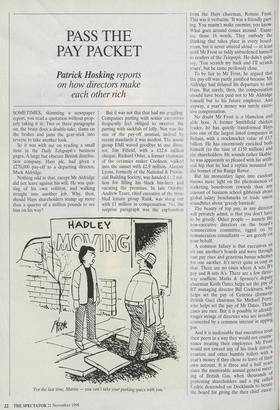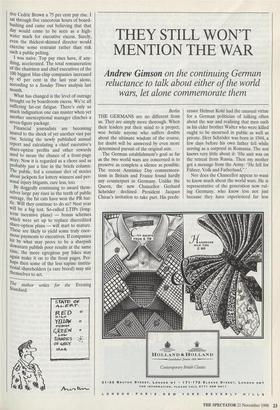PASS THE PAY PACKET
Patrick Hosking reports
on how directors make each other rich
SOMETIMES, skimming a newspaper report, you read a quotation without prop- erly taking it in. Two or three paragraphs on, the brain does a double-take, slams on the brakes and jams the gear-stick into reverse to take another look.
So it was with me on reading a small item in the Daily Telegraph's business pages. A large but obscure British distribu- tion company, Hays plc, had given a £270,000 pay-off to a departing director, Mark Aldridge.
Nothing odd in that, except Mr Aldridge did not leave against his will. He was quit- ting of his own volition, and walking straight into another job. Why, then, should Hays shareholders stump up more than a quarter of a million pounds to see him on his way? But it was not this that had me goggling. Companies parting with senior executives frequently feel obliged to sweeten the parting with sackfuls of lolly. Nor was the size of the pay-off unusual, indeed by recent standards it was modest. The music group EMI waved goodbye to one direc- tor, Jim Fifield, with a £12.4 million cheque. Richard Oster, a former chairman of the ceramics maker Cookson, walked into the sunset with £2.9 million. Alastair Lyons, formerly of the National & Provin- cial Building Society, was handed £i.2 mil- lion for filling his black bin-liner and vacating the premises. In late October Andrew Teare, chief executive of the trou- bled leisure group Rank, was slung out with £1 million in compensation. No, the surprise paragraph was the explanation `For the last time, Martin — you can't take your parking space with you.' from the Hays chairman, Ronnie Frost. This was it verbatim: 'It was a friendly part- ing. You mustn't make enemies, you know.
What goes around comes around.' Exam- ine those 16 words. They embody the thinking that takes place in every board- room, but is never uttered aloud — at least until Mr Frost so tidily unburdened himself to readers of the Telegraph. He didn't quite say, 'You scratch my back and I'll scratch yours', but he came perilously close. To be fair to Mr Frost, he argued that the pay-off was partly justified because Mr Aldridge had delayed his departure to suit Hays. But surely, then, the compensation should have been paid not to Mr Aldridge himself but to his future employer. And anyway, a year's money was surely exces- sive compensation. No doubt Mr Frost is a blameless and able boss. A former Smithfield chicken trader, he has quietly transformed Hays into one of the largest listed companies in Britain, with a stockmarket value of £3.5 billion. He has enormously enriched both himself (to the tune of £150 million) and the shareholders. He sounds rather likable: he was apparently so pleased with his artifi- cial hip that he had a replica mounted on the bonnet of his Range Rover. But his momentary lapse into candour throws more light on the phenomenon of rocketing boardroom rewards than any amount of business school gibberish about global salary benchmarks or trade union soundbites about 'greedy bastards'. The beauty of top pay, as any director will privately admit, is that you don't have to be greedy. Other people — namely the non-executive directors on the board's remuneration committee, egged on by remuneration consultants — are greedy on your behalf. A common fallacy is that executives sit on one another's boards and wave through vast pay rises and generous bonus schemes for one another. It's never quite as cosy as that. There are no cases where A sets B's pay and B sets A's. There are a few three- way conflicts: Marks & Spencer's deputy chairman Keith Oates helps set the pay of BT managing director Bill Cockburn, who helps set the pay of Centrica (formerly British Gas) chairman Sir Michael PerrY, who helps set the pay of Mr Oates. These cases are rare. But it is possible to identify longer strings of directors who are invisibly connected by a common interest in upping pay. And it is undeniable that executives treat their peers in a way they would not counte- nance treating their employees. Mr Frost would not reward any of his truck drivers, couriers and other humble toilers with a year's money if they chose to leave of their own account. It is three and a half years since the memorable annual general meet', ing of British Gas, when thousands 0_1 protesting shareholders and a pig called Cedric descended on Docklands to berate the board for giving the then chief execu" tive Cedric Brown a 75 per cent pay rise. I sat through five rancorous hours of board- bashing and came out believing that that day would come to be seen as a high- water mark for executive excess. Surely, even the thickest-skinned director would exercise some restraint rather than risk such a public pelting. I was naive. Top pay rises have, if any- thing, accelerated. The total remuneration of the chairmen and chief executives of the 100 biggest blue-chip companies increased by 45 per cent in the last year alone, according to a Sunday Times analysis last month.
What has changed is the level of outrage brought on by boardroom excess. We're all suffering fat-cat fatigue. There's only so much indignation one can muster when yet another unexceptional manager clinches a seven-figure package. Financial journalists are becoming inured to the shock of yet another vast pay rise. Seizing the newly published annual report and calculating a chief executive's share-option profits and other rewards used to mean the chance of a front-page story. Now it is regarded as a chore and as probably just a line in the briefs column. The public, fed a constant diet of stories about jackpots for lottery winners and per- sonal injury litigants, care less, too. By doggedly continuing to award them- selves large pay rises in the teeth of public outrage, the fat cats have won the PR bat- tle. Will they continue to do so? Next year will be a big test. So-called LTIPs (long- term incentive plans) — bonus schemes Which were set up to replace discredited share-option plans — will start to mature. These are likely to yield some truly enor- mous payments to executives. If companies hit by what may prove to be a sharpish downturn publish poor results at the same time, the more egregious pay hikes may again make it on to the front pages. Per- haps then some of the less supine institu- tional shareholders (a rare breed) may stir themselves to act.
The author writes for the Evening Standard.



















































































 Previous page
Previous page